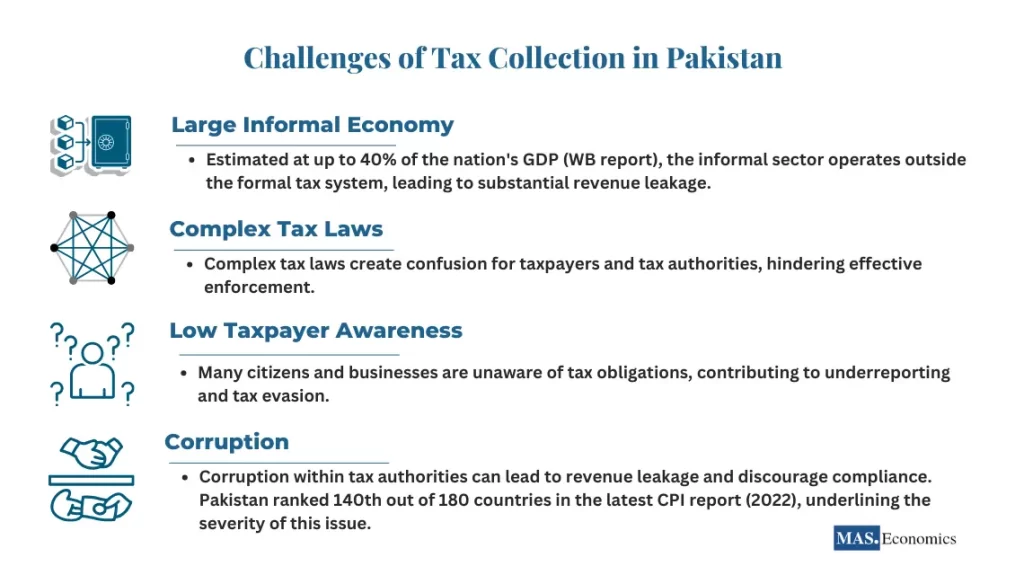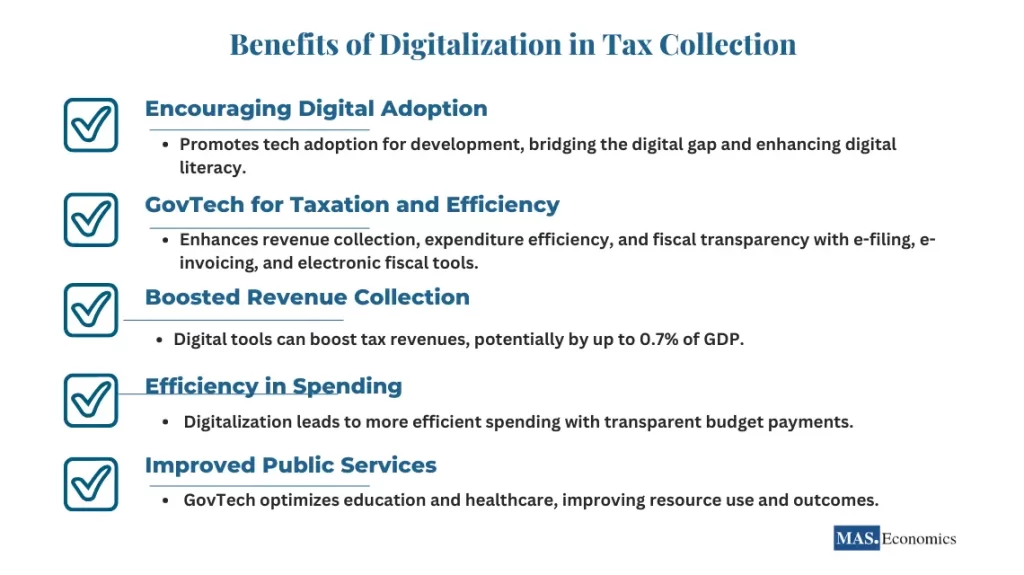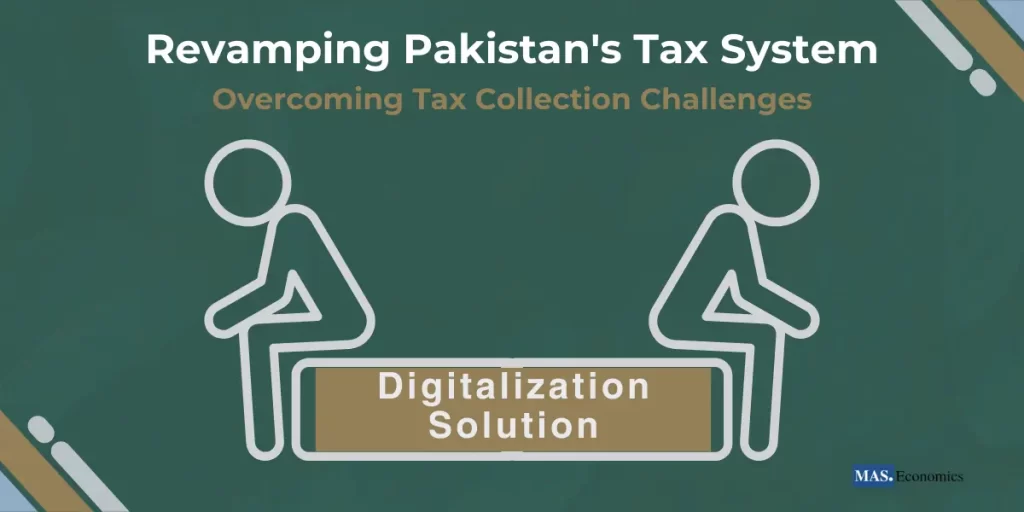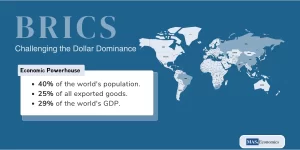Welcome to MASEconomics, your trusted source for insights into the world of economics. Tax systems are the lifeblood of nations, fueling economic growth, supporting public services, and ensuring a fair and equitable society. In Pakistan, like in many other countries, the effectiveness of the tax system directly impacts the well-being of its citizens. In this article, we will understand Pakistan’s tax revenue system and its challenges and explore viable solutions to enhance its tax collection, with a focus on the transformative potential of digitalization.
The Importance of Tax Revenue
Before delving into the complexities of Pakistan’s tax revenue challenges and solutions, let’s underscore tax revenue’s critical role in the nation’s development. Tax revenue is the financial backbone of Pakistan, essential for its economic progress. It is the currency through which the government finances public services such as education, healthcare, infrastructure, and social welfare programs. Furthermore, tax revenue serves as a stabilizing force in the nation’s economy, promoting sustainable growth and reducing poverty.
The Challenges of Tax Collection in Pakistan
However, Pakistan faces a formidable set of challenges in collecting tax revenue, which impedes its ability to harness the full potential of this vital resource. These challenges are deeply intertwined with the country’s economic landscape:

A Large Informal Economy
Pakistan faces a significant challenge with a vast informal economy, estimated at almost 40% of the nation’s GDP (WB report). This informal sector primarily operates under the radar of the formal tax system, resulting in substantial revenue loss for the government. This sector’s lack of proper documentation and oversight poses a significant hurdle to practical revenue collection efforts. Many individuals and businesses prefer the informal sector due to factors like limited regulations, tax evasion, or a lack of awareness about formal options.
A study has highlighted the extensive prevalence of informality in Pakistan’s economy. It emphasizes the wide-reaching implications of this informality on taxation, highlighting the need for innovative solutions to integrate this sector into the formal economy and enhance tax collection.
Complex Tax Laws
Navigating Pakistan’s tax landscape can be a real headache due to its complex and often confusing tax laws. These complex regulations create challenges for both taxpayers and tax authorities. The resulting confusion makes it difficult for taxpayers to comply with tax laws, while tax authorities need help enforcing them effectively.
For instance, understanding how various tax provisions apply to specific situations can be daunting for taxpayers. At the same time, tax authorities need help enforcing these intricate laws effectively. To illustrate, imagine a small business owner struggling to decode the tax code’s complexities while trying to meet their tax obligations.
Recent research has delved into the complexities of Pakistan’s tax structure. It examines how these complex tax laws impact economic growth, emphasizing the need for tax reforms and simplification to improve compliance and boost economic development.
Low Taxpayer Awareness
One critical challenge in Pakistan is more taxpayer education and awareness programs. Many citizens and businesses need to be fully aware of their tax obligations. This lack of awareness, combined with Pakistan’s large population and low literacy rates, contributes to widespread underreporting and tax evasion. For instance, a substantial portion of the population may not even be aware of the taxes they are required to pay.
Studies have stressed the importance of robust taxpayer education initiatives. Their research highlights how effective education programs can significantly enhance tax compliance and contribute to a fairer tax system.
Corruption
Corruption is a pervasive challenge in Pakistan, affecting various aspects of society, including tax collection. Instances of corruption within tax authorities can lead to revenue leakage and discourage taxpayers from fulfilling their obligations.
Research has provided valuable insights into the relationship between corruption and tax evasion. The study comprehensively examines how corruption erodes the tax base and suggests measures to mitigate these challenges, ultimately strengthening tax collection efforts.
Additionally, it’s important to note that corruption in Pakistan is also linked to another critical issue – money laundering. This connection underscores the need for comprehensive efforts to combat corruption, not only to improve tax collection but also to address money laundering and its adverse economic effects.
Benefit of Digitalization in Tax Collection
In an era where digitalization is transforming societies and economies, Pakistan can leverage GovTech (Government Technology) to address these longstanding tax collection and fiscal management challenges. The transformative potential of digitalization in enhancing public finance is significant, and here’s how Pakistan can benefit:

Encouraging Digital Adoption
Emerging and developing countries, including Pakistan, have the most potential to leapfrog their development trajectory by adopting digital technologies. However, internet connectivity remains a challenge, with many Pakistanis needing access. To bridge this digital divide, Pakistan must invest in digital infrastructure, making the internet more accessible and affordable.
The IMF estimates that $418 billion of investment in digital infrastructure is needed to connect unconnected households, with significant requirements in emerging market economies. Government support can be crucial in achieving universal connectivity.
How Pakistan Can Implement This
The government can incentivize or directly invest in building internet infrastructure, especially in underserved regions. Additionally, offering discounts or vouchers on subscription fees and promoting digital literacy programs will make internet access more affordable and widespread.
GovTech: Boosting Taxation and Fiscal Efficiency
Digitalization enables governments to leverage technology for enhanced revenue collection, improved efficiency in public spending, and greater fiscal transparency and accountability. For Pakistan, adopting GovTech in fiscal operations can yield several benefits:
Enhanced Revenue Collection
E-filing, e-invoicing, and electronic fiscal devices can significantly boost tax revenues. For instance, adopting e-invoicing and electronic fiscal devices could improve revenue mobilization by up to 0.7 percent of GDP.
Efficiency in Expenditure
Digitalization generally leads to more efficient expenditure. Automation of budget payments using digital technologies is associated with increased budget transparency.
Improved Public Services
Digital interventions can enhance the quality of public service delivery. In education, providing students with equipment and software can improve outcomes. In healthcare, GovTech can optimize resource utilization and enhance healthcare quality.
IMF staff analysis suggests that digitalization is generally associated with improvements in expenditure efficiency.
How Pakistan Can Implement This
Pakistan can prioritize the adoption of e-filing, e-invoicing, and electronic fiscal devices to boost tax revenues. Additionally, automating budget payments and enhancing digital infrastructure within the public sector can increase budgetary transparency and efficiency. GovTech solutions can be implemented in healthcare and education to optimize resource utilization and improve service quality.
Conclusion
In conclusion, Pakistan’s tax collection challenges can be addressed, and its fiscal efficiency enhanced through the strategic adoption of digitalization, as outlined in the IMF’s insights on GovTech. By bridging the digital divide, encouraging digital adoption, and leveraging technology for taxation and fiscal management, Pakistan can pave the way for a more prosperous future. The commitment of the government, coupled with active engagement with stakeholders, is the key to achieving sustainable growth in tax revenue and fiscal efficiency.
Thank you for joining us on this journey to explore Pakistan’s tax system and the potential of digitalization in transforming it. If you found this article insightful, please share it with your friends and across your social networks.
Discover more economic insights with MASEconomics!”




